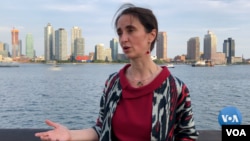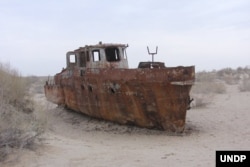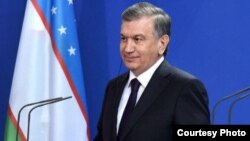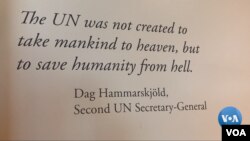Helena Fraser, UN Resident Coordinator in Uzbekistan, talks to VOA's Navbahor Imamova about how the world body is working with this Central Asian republic, where she says, the organization sees a "transformational change." How are reforms going? Also, is the United Nations still relevant to the ordinary people? What does an experienced UN diplomat say to those cynics who argue that UN does not deliver anymore? A candid conversation in New York, on the sidelines of the 74th session of the UN General Assembly. (Full video below)
Full transcript
Navbahor Imamova, VOA Uzbek: Thanks for joining us here in New York!
Helena Fraser, UN Uzbekistan: It's great to see you!
Navbahor Imamova, VOA Uzbek: The UN Climate Action Summit just ended... Guests from Uzbekistan also attended the UN Youth Summit earlier. What were the main highlight for you?
Helena Fraser, UN Uzbekistan: We can all say that the highlight was really the opening with Greta Thunberg, the young Swedish Activist. Challenging this room full of Presidents, Prime Ministers, Ministers of Foreign Affairs and saying essentially, "You've done this to our generation, we challenge you to realize that the depth of the mistakes that have been made and to work with us. And if you don't work with us, you know this, the young generation will never forgive what you've done."
Navbahor Imamova, VOA Uzbek: So in a way, holding the older generation responsible for what has been taken place on the planet.
Helena Fraser, UN Uzbekistan: And for not moving fast enough for sense, essentially. And the Secretary General basically said, "This is not a climate, a chat, a climate talk shop. This is a climate action summit. And the tickets to enter, the ticket to speak was not whether your country is big or important, it was whether your country has something to commit to. And whether your country was prepared to actually publicly state that commitment." And we had presidents of different countries saying 'my country will be a net zero carbon emissions by 2050.'
Or a range of other important commitments were announced today. We had the Mayor of Montreal in Canada making commitments on behalf of the city of Montreal. We had Mr. Bloomberg who used to be the Mayor obviously here in New York. And he also made commitments on behalf of the private sector. And you know this was really an opportunity for leaders to come and talk about action and I think the call to act at the beginning from this young Swedish Activist was really the highlight for many people.
Navbahor Imamova, VOA Uzbek: And you are here with some of the members of the Uzbek parliament?
Helena Fraser, UN Uzbekistan: Yes.
Navbahor Imamova, VOA Uzbek: And some of the members of the Mirziyoyev Administration.
Helena Fraser, UN Uzbekistan: Yes.
Navbahor Imamova, VOA Uzbek: We are going to talk to them too. But I'm just curious about how you see their role. These people, let's say, come to New York, listen to these big conversations about the global climate. Learn from the experiences of cities like Montreal and New York. They go back and what can they do?
... energy efficient rural housing, which I think is a major challenge for Uzbekistan. Energy efficiency standards have been historically not tied in public housing and getting commitments to really tackle that issue. And UNDP in particular is working with the government to address this as a priority, recognizin
Helena Fraser, UN Uzbekistan: Well, I think this is not a one day event. We hope the UN team and Uzbekistan has been working with the administration and with the Oliy Majlis in the run up to this event and we're really happy that Uzbekistan submitted its international commitments to the United Nations a few weeks ago. So that they will be published in the outcome document. Those commitments included one that was already made, which is a commitment to reduce by 10% greenhouse gas emissions under the Paris Convention but also under the Montreal Protocol to reduce the emission of greenhouse gases by 2020.
But there was a range of other new commitments and I think that's what the fruit of the engagement, the dialogue we've been having. Some of those commitments include the implementation of renewable energy commitments and targets under the new renewable energy strategy, energy efficient rural housing, which I think is a major challenge for Uzbekistan. Energy efficiency standards have been historically not tied in public housing and getting commitments to really tackle that issue. And UNDP in particular is working with the government to address this as a priority, recognizing it's a major source of carbon emissions in Uzbekistan.
Navbahor Imamova, VOA Uzbek: When the Uzbek officials discuss the environmental issues, they usually see treat them as regional issues. Basically, they indicate that to solve those issues we have make regional efforts... Where is Uzbekistan in terms of the environmental awareness? To what extent do you think the country knows the real issues that have to do with its agriculture, for example, or just in terms of clean water? We just talked to a young environmentalist from Khorezm, who is representing Uzbekistan here, and she says water contamination is a big issue...
Helena Fraser, UN Uzbekistan: Well, I think the fact that one young Uzbek lady won a ticket out of 7,000 applicants. Only a hundred people, one of those green tickets to the summit and the fact that she won it on the basis of her environmental commitment and passion and knowledge. It shows you that, yes there is a young generation in Uzbekistan who knows and understands. But I would agree that there is always more one can do. And I have actually had that discussion with the Head of the State Committee on Environment who said, "We need to start the education right at pre school about everything from pollution to water usage. When you see people wasting water in a country that's water short, it's always hard to look at."
And this I think is something that the government does want to invest in more. And there is some way to go. But I think there is a young generation of climate conscious young people out there. We saw that in hash hour week, which a young lady also worked in mobilizing a community engagement in cleanups last year. And I think there's more ambitious plan for this year. And in terms of the sub regional angle, I think dealing with the climate crisis as we've seen from the range of stakeholders invited to this conference. It's really, it can't just be government policy, it can't be sub-regional commitment. It has to go from the grassroots up and from the global policy down. And that's why-
Navbahor Imamova, VOA Uzbek: So from every angle.
Helena Fraser, UN Uzbekistan: From every angle. That's why this kind of forum does matter. And I do think it's important that Uzbekistan has a substantive delegation here. Because it's also really important to see, yes the mayor of big cities are taking climate commitment seriously.
Some of the heads of the biggest private sector companies in the world are moving in fact faster towards carbon neutrality than governments. And when you come here and you see this global coalition, it also galvanizes you to act. And I think having also the important delegations and discussions led by neighboring countries is also an important opportunity for cross-fertilization at sub regional level. But obviously there are some aspects like trans boundary pollution issues, which are sub regional by nature.
Navbahor Imamova, VOA Uzbek: We know that under your guidance and representation, the United Nations agencies have been expanding their activities in Uzbekistan. And in our last year's conversation you told me that there were 10 UN groups that were involved in fighting the impact from the Aral Sea drying up.
Helena Fraser, UN Uzbekistan: Yes, yes, yes.
Navbahor Imamova, VOA Uzbek: The Aral Sea Focus Group. Has there been any progress? What is the progress so far?
Helena Fraser, UN Uzbekistan: Yeah. I mean the Aral Sea is a tragedy... the UN can't restore the Aral Sea but we can work to bring global good practice, innovation, good technologies to tackle the human impact of the disappearance of the Aral Sea. And also to mitigate the further deterioration of the impact on on local people. So together with government we have done social economic needs assessment, which really looked at community's perspectives. There are 4 million people living in the effected area and we really wanted to hear from them what the challenges they face related to the Aral Sea situation.
Navbahor Imamova, VOA Uzbek: Just like data gathering.
Helena Fraser, UN Uzbekistan: Yes. Which is data in respect to sun has traditionally been sometimes difficult. And so there's socioeconomic needs assessment which has now open data we share on demand is a really in depth overview.
And of course the people's concerns were jobs, health, clean water, education, access to medicines. Those were the top five. And what we're trying to do through our UN joint efforts is support the government to tackle those in a community based and sustainable way. So for example, mobilizing the community in afforestation efforts will help those efforts to be a longterm. Getting the community involved in a co-operative, supporting people with understanding how to ensure that the seeds gathering and planting process works over the longer term in a rather salty soil and in a water short area.
Looking at the latest global technologies, deriving a good impact, good assessments from countries that have done this and channeling those to Uzbekistan. But also working on green economy issues, green jobs. How can we help the people of the effected region to change their skillsets so that they are able to contribute to the economy of their region despite the loss of the Aral Sea as it were.
And then also looking at the health situations. So we have a very interesting project, very community driven and community led project with UNICEF and UNFPA. Also looking at maternal and child health, which was a very big priority for people in the area. And I would say yes, we have seen very good results over the last six years of this joint UN engagement in the region.
We've seen some significant positive and what I think is most important sustained changes in the outcomes and the indicators that we've been measuring related to people's health, people's livelihoods, people's access to clean water. And that is the reason why this multi-partner trust fund, which was launched last year, has gained the confidence of government of local government. We have civil society organizations on the steering committee, grassroots organizations.
Navbahor Imamova, VOA Uzbek: I believe that there are some $8 million there already. Is that right?
Helena Fraser, UN Uzbekistan: Right. That's about right. Yes. There's the government of Uzbekistan, the government of Norway and then about to be a contribution from the European Union.
Navbahor Imamova, VOA Uzbek: And that money goes to the Uzbek government or to the area's projects?
Helena Fraser, UN Uzbekistan: Goes through the United Nations in partnership with government and local communities. But it's implemented by the United Nations because the idea being that the government already has an enormous hundreds of millions of dollars state program for the Aral Sea region. I'm sure you're aware. They don't need our 8 million... It's really to bring the global capacity and experience the innovation and the focus on results and sustainability. And so we're deliberately coordinating closely with government.
In fact, the Deputy Prime Minister co-chairs the steering committee so that we can help pilot new approaches which then the government can take to scale through their program. It's all about working in partnership but also when you have the UN system involved it means there is some confidence from the donor countries that they can put their resources there and feel comfortable with the accountability level of transparency and so forth.
I can say to you very clearly that what's happening in Uzbekistan from a UN perspective is transformational change in a positive direction. Yes, there's a lot to do and we see this, the government acknowledges it and they're working so hard to achieve the priorities that have been set.
Navbahor Imamova, VOA Uzbek: So working in partnership, you regard the Uzbek government as a reliable partner, obviously. You have been supporting the steps President Mirziyoyev and his administration have been taking. When we talked last year you said that there was a lot more to do, obviously, and that the United Nations is watching. And for Uzbekistan, criticized for so long about not meeting its international obligations and having one of the worst human rights records in the world. Worst, worst, worst in many ways. Have things improved? ... How do you describe the reform process in Uzbekistan? Are you as hopeful as you were last September when we talked?
Helena Fraser, UN Uzbekistan: I can say to you very clearly that what's happening in Uzbekistan from a UN perspective is transformational change in a positive direction. Yes, there's a lot to do and we see this, the government acknowledges it and they're working so hard to achieve the priorities that have been set. I think on the human rights front we've seen breakthroughs that I wouldn't have imagined. The fact that the United Nations Special Rapporteur on the Independence of Judges and Lawyers is in Uzbekistan right now meeting freely with members of civil society, bit being taken to visit the court systems, talking to judges, talking to defense lawyers about the independence of the judiciary. That is unthinkable a few years ago and he will make his free and independent observations day after tomorrow I think. And then a full report will be submitted next year with recommendations. This is a really, really important step.
We know that lack of public confidence in the rule of law and in the judiciary is a feature. And we know that there are steps that needs to be taken. Uzbekistan has taken a number of positive steps on strengthening the independence of judges. There is much more to do and I think having this visit by the UN Special Rapporteur will give an extra momentum to these efforts. But I don't just take that the human rights area, any area that I look at that has been remarkable change in the last two to three years. I would say that some of the changes at the policy level and now needs to be implemented and that is also in itself a challenge in any transformation of this nature. The capacity to execute the new policies is going to be challenging when so many new policies are happening at the same time.
Navbahor Imamova, VOA Uzbek: What should be a priority? I mean at some point you have to focus more on some other issues, right? On some specific issues. It seems that the Uzbek government wants to achieve, wants to make definite progress as we hear from President Mirziyoyev on pretty much every level on every issue, which is virtually impossible. How do you advise them? I mean, I know that they seek your advice on a regular basis. How should they focus? What should they be the main point of attention like at this given time?
Helena Fraser, UN Uzbekistan: Well last year together with the World Bank the UN team did an analysis on exactly that issue. Where are the greatest fruits to ensure the sustainability of the wider reform process. But more importantly from a UN perspective to ensure that Uzbekistan's national sustainable development targets are met. Because if you think about the range of sustainable development goals it is everything.
Navbahor Imamova, VOA Uzbek: Definitely poverty, gender equality-
The first is really on the governance rule of law side. A strong emphasis on the need to build capacity in the civil service, public administration reform and a rule of law.
Helena Fraser, UN Uzbekistan: ...infrastructure, climate change, health, education, you name it. So we did an analysis. Given these are the targets that have been adopted and given the action strategy for development, which is very closely aligned to the global SDGs, where are the pin points where a strong investment would have most significant cascading positive results? Yeah. And there were three outcomes. The first is really on the governance rule of law side. A strong emphasis on the need to build capacity in the civil service, public administration reform and a rule of law.
The second cluster of issues was human capital. That a strong investment in a really good robust coherence, social protection system and health and education capacities would pay great dividends towards the longterm achievement of reducing inequality, ensuring decent jobs and so forth.
And then the third cluster of issues was environment and climate change. Natural resources in Uzbekistan are under great pressure. And a strong focus on that in our view is also going to have longer term cascading positive impacts on the drive to create jobs. The drive to create a flourishing economy with minimal inequalities. Which is what the agenda 2030 is all about. So those are the three areas that we advised to focus on and the UN system has really tried to focus our efforts in supporting those areas in particular.
Navbahor Imamova, VOA Uzbek: How many UN Agencies are working in Uzbekistan now?
Helena Fraser, UN Uzbekistan: 12.
Navbahor Imamova, VOA Uzbek: 12 of them?
Helena Fraser, UN Uzbekistan: Yes.
Navbahor Imamova, VOA Uzbek: Is the Refugee Agency coming back?
Helena Fraser, UN Uzbekistan: The UN, well there are 12 agencies present in Uzbekistan. There are other agencies that cooperate from outside. So in January this year UNHCR, the refugee agency, re-engaged and that was great. There was a period when they were less able to engage and that under the new administration has changed. So they've reengaged on two issues. There are 12 remaining refugees in Uzbekistan from long time ago.
Used to be much higher figure, gradually reduced as people have found longterm sustainable solutions with UNHCR support or by the government. But there issues that UNHCR the refugee agency really wants to cooperate on is, statelessness in many Central Asian countries. There was a legacy of people caught after the Soviet Union.
Navbahor Imamova, VOA Uzbek: They have no passports.
Helena Fraser, UN Uzbekistan: Indeed. And so there is a goal to reduce to zero the number of stateless people in Central Asia and Uzbekistan is making positive progress. Uzbekistan has something to be proud of in terms of its birth registrations. Very good on ensuring every child born is registered and it has reduced by several thousands the number of stateless people according to the data that we've seen.
Navbahor Imamova, VOA Uzbek: Thank you for being so patient and having this wonderful conversation with me. I have one more question. So I wrote earlier on one of my social media pages about the fact that we are here and we'll be covering the UN General Assembly session opening and then everything else that's going on, that has something to do with Uzbekistan and Central Asia. People are very cynical when it comes to the United Nations. So, they immediately expressed their views. I had some comments from our fans, who are saying, "UN is practically just like our government... They promise or they say the big things, they promise too much to the humanity but they don't deliver." They question the credibility of such big mechanisms.
What do you say to them? As a representative of the United Nations, what would you say from this spot, where the UN headquarters are. Where this big organization has been housed since 1952 if I'm not mistaken. And for 74 times they have come together at the General Assembly to discuss things. The organization also discusses its budget here. 193 states are members of this organization, and Uzbekistan has been a member since 1992. So one could look at it as a historic process, evolution in itself. But at the same time you have a lot of Uzbeks and Central Asians, in general, who say: "So what?"
Helena Fraser, UN Uzbekistan: When I hear cynical feedback about the UN, the first thing that comes to me is my children. The reason that our children are healthy is because around the world the UN has worked through Ministries of Health to raise the standards of child's health and reduce child mortality, reduced maternal mortality.
So I believe that the UN isn't, it was not going to save the world. But it's going to help governments and citizens of the world to make good choices about how to ensure a more prosperous and more dignified life for the citizens of the planet.
And if you look at vaccinations a small issue that has saved millions and millions of lives around the world. And without the global policy coordination, without the global standard setting that the World Health Organization brings, we wouldn't have the global coherence. And of course epidemics know no borders. So this is exactly the of issue that the UN excels at. Same goes for food and agricultural standards for food security. The same goes for environment standards. The kind of discussion we're having here today, the kind of commitments that were announced at Presidential level to bring countries to carbon neutrality would never have happened without the convening power of the United Nations.
So I believe that the UN isn't, it was not going to save the world. But it's going to help governments and citizens of the world to make good choices about how to ensure a more prosperous and more dignified life for the citizens of the planet. A life where there is greater chance of peace, a greater chance of having your rights upheld and a greater chance to achieve prosperity.
Navbahor Imamova, VOA Uzbek: Thank you so much and congratulations by the way. Best wishes on the award that you recently got from the Uzbek Government. How did you feel about it when you were informed about it?
Helena Fraser, UN Uzbekistan: Well, I was obviously very surprised and extremely honest. It's really, to my mind, it's a recognition for the whole UN team working in Uzbekistan. That the work we do on a day to day basis is meaningful. And that the UN as an institution has the respect of the government. And that, of course is something that it is very very important for us working day in, day out for what we believe in. And of course, I respect that some people feel differently about the UN. But I believe in what the UN does. And I think it was a great honor to be awarded like that.
Navbahor Imamova, VOA Uzbek: Thank you so much again. Good luck.
Helena Fraser, UN Uzbekistan: Thank you. Thanks very much.











Facebook Forum